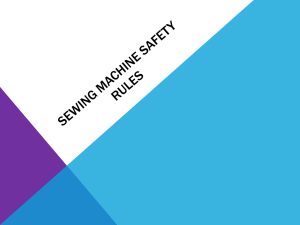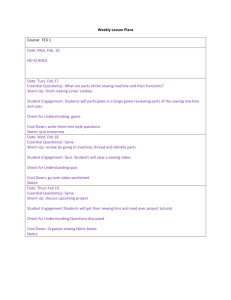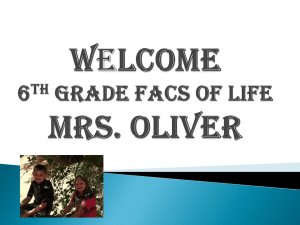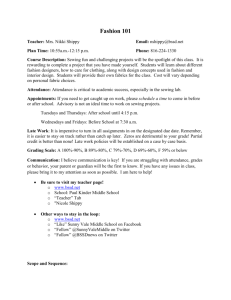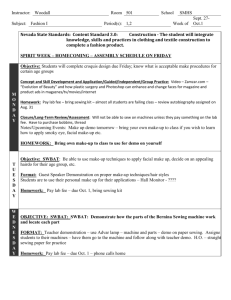Latino Homemaker Programs in Piute County
advertisement
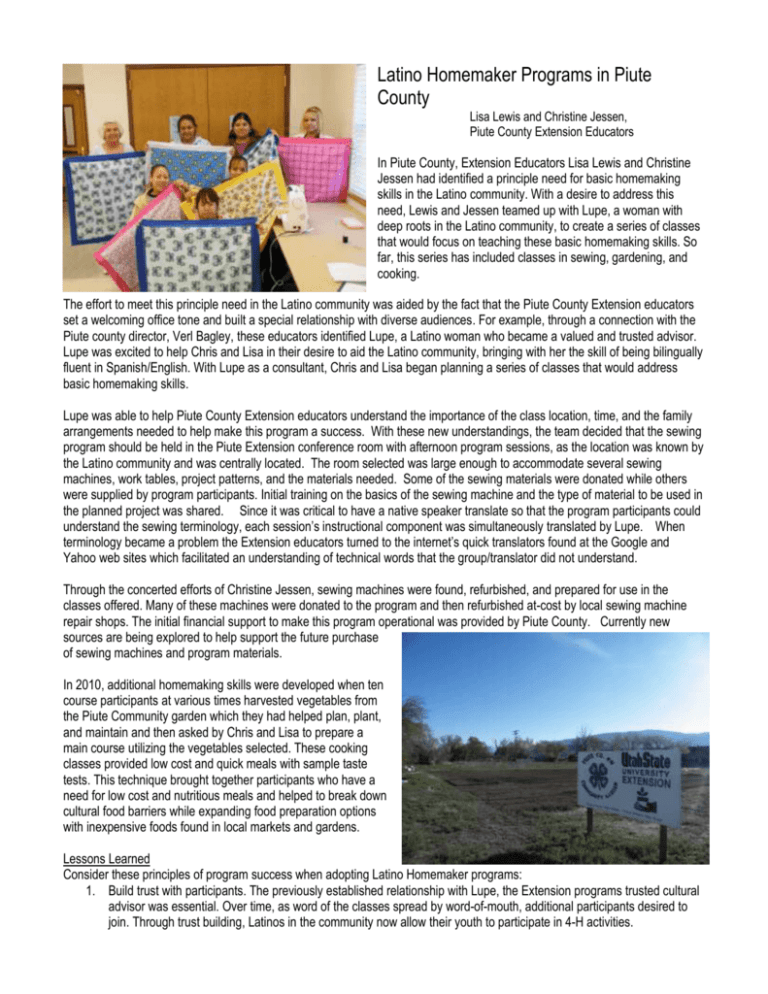
Latino Homemaker Programs in Piute County Lisa Lewis and Christine Jessen, Piute County Extension Educators In Piute County, Extension Educators Lisa Lewis and Christine Jessen had identified a principle need for basic homemaking skills in the Latino community. With a desire to address this need, Lewis and Jessen teamed up with Lupe, a woman with deep roots in the Latino community, to create a series of classes that would focus on teaching these basic homemaking skills. So far, this series has included classes in sewing, gardening, and cooking. The effort to meet this principle need in the Latino community was aided by the fact that the Piute County Extension educators set a welcoming office tone and built a special relationship with diverse audiences. For example, through a connection with the Piute county director, Verl Bagley, these educators identified Lupe, a Latino woman who became a valued and trusted advisor. Lupe was excited to help Chris and Lisa in their desire to aid the Latino community, bringing with her the skill of being bilingually fluent in Spanish/English. With Lupe as a consultant, Chris and Lisa began planning a series of classes that would address basic homemaking skills. Lupe was able to help Piute County Extension educators understand the importance of the class location, time, and the family arrangements needed to help make this program a success. With these new understandings, the team decided that the sewing program should be held in the Piute Extension conference room with afternoon program sessions, as the location was known by the Latino community and was centrally located. The room selected was large enough to accommodate several sewing machines, work tables, project patterns, and the materials needed. Some of the sewing materials were donated while others were supplied by program participants. Initial training on the basics of the sewing machine and the type of material to be used in the planned project was shared. Since it was critical to have a native speaker translate so that the program participants could understand the sewing terminology, each session’s instructional component was simultaneously translated by Lupe. When terminology became a problem the Extension educators turned to the internet’s quick translators found at the Google and Yahoo web sites which facilitated an understanding of technical words that the group/translator did not understand. Through the concerted efforts of Christine Jessen, sewing machines were found, refurbished, and prepared for use in the classes offered. Many of these machines were donated to the program and then refurbished at-cost by local sewing machine repair shops. The initial financial support to make this program operational was provided by Piute County. Currently new sources are being explored to help support the future purchase of sewing machines and program materials. In 2010, additional homemaking skills were developed when ten course participants at various times harvested vegetables from the Piute Community garden which they had helped plan, plant, and maintain and then asked by Chris and Lisa to prepare a main course utilizing the vegetables selected. These cooking classes provided low cost and quick meals with sample taste tests. This technique brought together participants who have a need for low cost and nutritious meals and helped to break down cultural food barriers while expanding food preparation options with inexpensive foods found in local markets and gardens. Lessons Learned Consider these principles of program success when adopting Latino Homemaker programs: 1. Build trust with participants. The previously established relationship with Lupe, the Extension programs trusted cultural advisor was essential. Over time, as word of the classes spread by word-of-mouth, additional participants desired to join. Through trust building, Latinos in the community now allow their youth to participate in 4-H activities. 2. The program participants in the class were allowed to bring their younger children with them. This provided an opportunity for parents to participate and ensured a safe area for the participants’ children. Snacks were often provided and games, videos available for the children to utilize while participants engaged in the learning activities. 3. The sewing classes offered in Piute County were free of charge. The low cost/no cost of the class was critical to participation by this diverse group. 4. Program marketing focused on the Latino communications network of the trusted cultural advisor. Lupe was effective in getting program information out, generally by word-of-mouth. The Extension office provided an advertisement flyer as an additional marketing supplement. 5. Classes were offered in the early afternoons which allowed for greater participation, reducing the potential conflicts with potentially non-supportive partners /spouses and the need to care for school age children. D.L.Holmes 11.10 Further information on program adoption in your area contact: Lisa Lewis –FCS Agent and Christine Jessen- 4H Assistant Piute County Office 435-577-2901.



